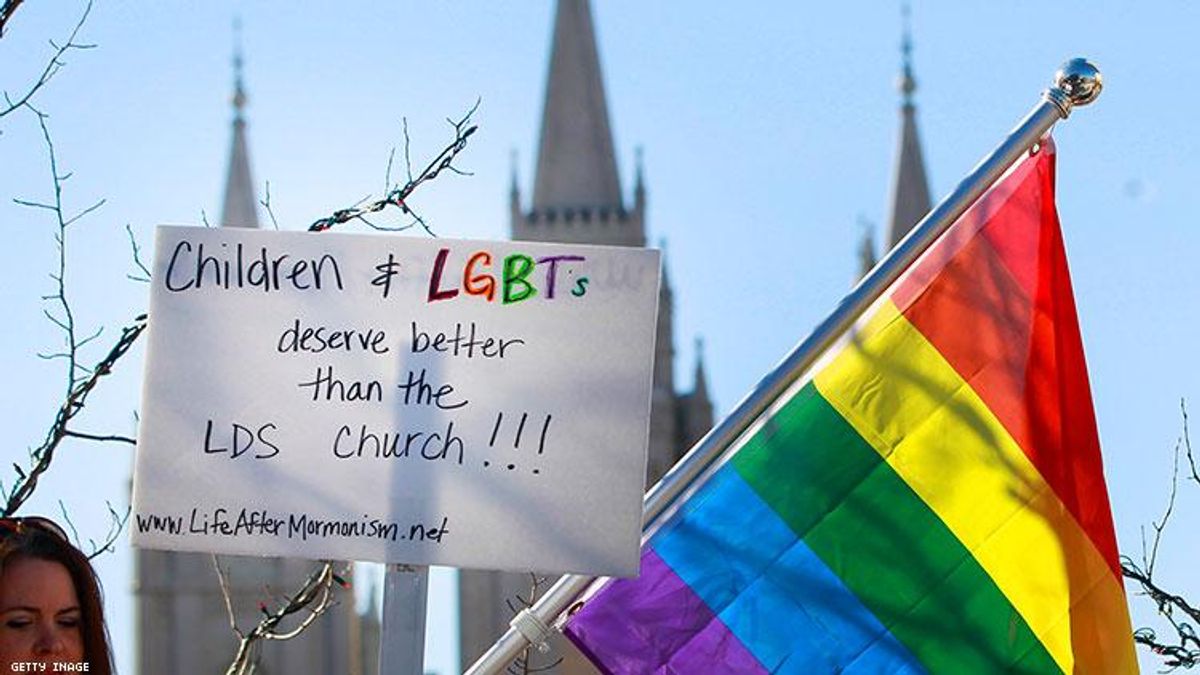On April 4, 2019, the Mormon church announced an update to an antigay policy commonly referred to as the "policy of exclusion." The original policy labeled all married LGBTQ+ Mormons as "apostates" and barred their children from being blessed or baptized in the faith until they turned 18. The update re-labels these same couples as "serious transgressors" (instead of apostates) and allows their children to be blessed and baptized into the faith.
Personally, I find the specifics of the change somewhat inconsequential because frankly, being recast from the role of "apostate" to "serious transgressor" doesn't exactly feel like an upgrade. The intimacy of a married same-sex couple is still considered sinful whereas the intimacy of a married heterosexual couple is considered sacred. The reversal doesn't seek to address the concerns, equality, or experience of LGBTQ+ Mormons. Most tellingly, the announcement wasn't even deemed important enough to be delivered publicly over the pulpit. Instead, it was announced at a closed leadership meeting that a line of text would be altered in a handbook; a line edit that effectively lessened the blow of condemnation through modified terminology.
As texts and phone calls from family and friends began to roll in, each conversation eventually asked the same basic question: was the reversal of the policy enough? It made me pause. What does enough look like in this case? And enough for what?
In order to decide what is enough, it is important to fully acknowledge the collateral damage of the November 2015 policy. Mormons, both LGBTQ+ and straight, were devastated as suicide claimed members of their community grappling with the label of "apostate." Closeted teenagers imagined futures cut off from their families while parents contemplated eternities without their own children. Children of LGBTQ+ parents were disqualified from the rites of passage their friends experienced. This hill of psychological pain sits atop a mountainous legacy of LGBTQ+ mistreatment that includes abusive conversion therapy and political organizing against LGBTQ+ rights. While the November 2015 policy caused much of this pain, the April 2019 reversal has exposed the extent to which it remains unhealed.
This is because the policy wasn't changed for the benefit of LGBTQ+ Mormons. While we may be the subject of the reversal, we are not its intended audience. Instead, the change is designed to quiet the beleaguered hearts of Mormons burdened with the emotionally duplicitous task of loving their LGBTQ+ children, siblings, and friends, while simultaneously loving the religion that categorizes these people as inherently unequal. For many Mormons, this has proven unsustainable, which may be one of the reasons why 2018 saw the largest number of membership records ever removed in a single year. The tension between loving someone and loving your faith is an experience most LGBTQ+ Mormon can (and should) be sympathetic to.
The policy change cannot be taken out of the context of this mass disaffection. So, instead of asking LGBTQ+ Mormons if the policy is enough for them, members of the Restored Church should ask if the updated policy is enough for themselves. You are the audience Mormon leadership is attempting to accommodate. With the pain of the last 3.5 years in your mind, I flip the script and ask: is this revision enough for you? Does it align with your vision for the potential of your religious community? Is it enough for you to stay? To pay your tithing? To believe?
The question of what constitutes enough naturally forms in response to the policy's originators' refusal to apologize for it. Apologies provide the necessary vulnerability and humility around which forgiveness, catharsis, and healing can grow. But in the absence of an official apology facilitating communal reconciliation, Mormon leadership shirk their opportunity and responsibility to be exemplars of the gospel they preach and effectively export this emotional labor onto the shoulders of their membership. Equipped with Mormon hearts genuinely desperate to be nice and do good, members further export this burden to the LGBTQ+ community by asking us if this revision is enough.
And to put it bluntly, that's really frustrating. Your absolution is not my responsibility. Do not ask me to lighten the burden of participating in a prejudicial theology by seeking my approval of policies I did not create that fail to acknowledge my basic humanness through equality. Do not hand your burden down to me. Be strong and push it back up to those who put it on your shoulders.
Lest we forget, in regards to the policy, we all lost something, whether it was a person, a relationship, or simply time and mental energy that would have been better spent being kind to one another. In the face of shared loss, apologizing does not create winners.
It seems Mormonism may be grappling with a generation whose testimony of equality is stronger than their testimony of the Restored Church.
That's why, for many of us, enough is enough.
CRAIG MANGUM is a writer and founder of The OUT Foundation, a philanthropic network for the LGBTQ+ alumni of Brigham Young University. Follow him on Twitter @CraigNMangum














































































